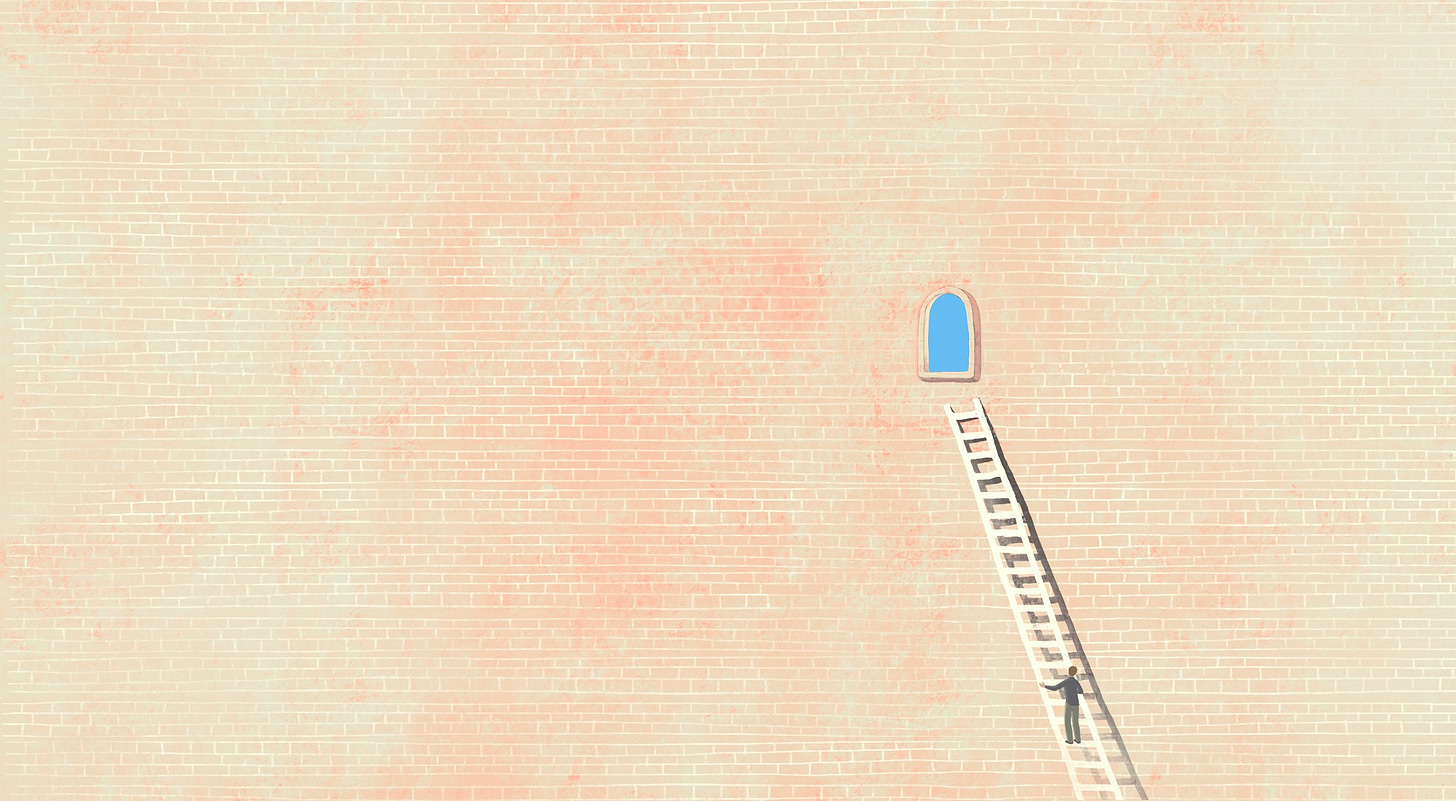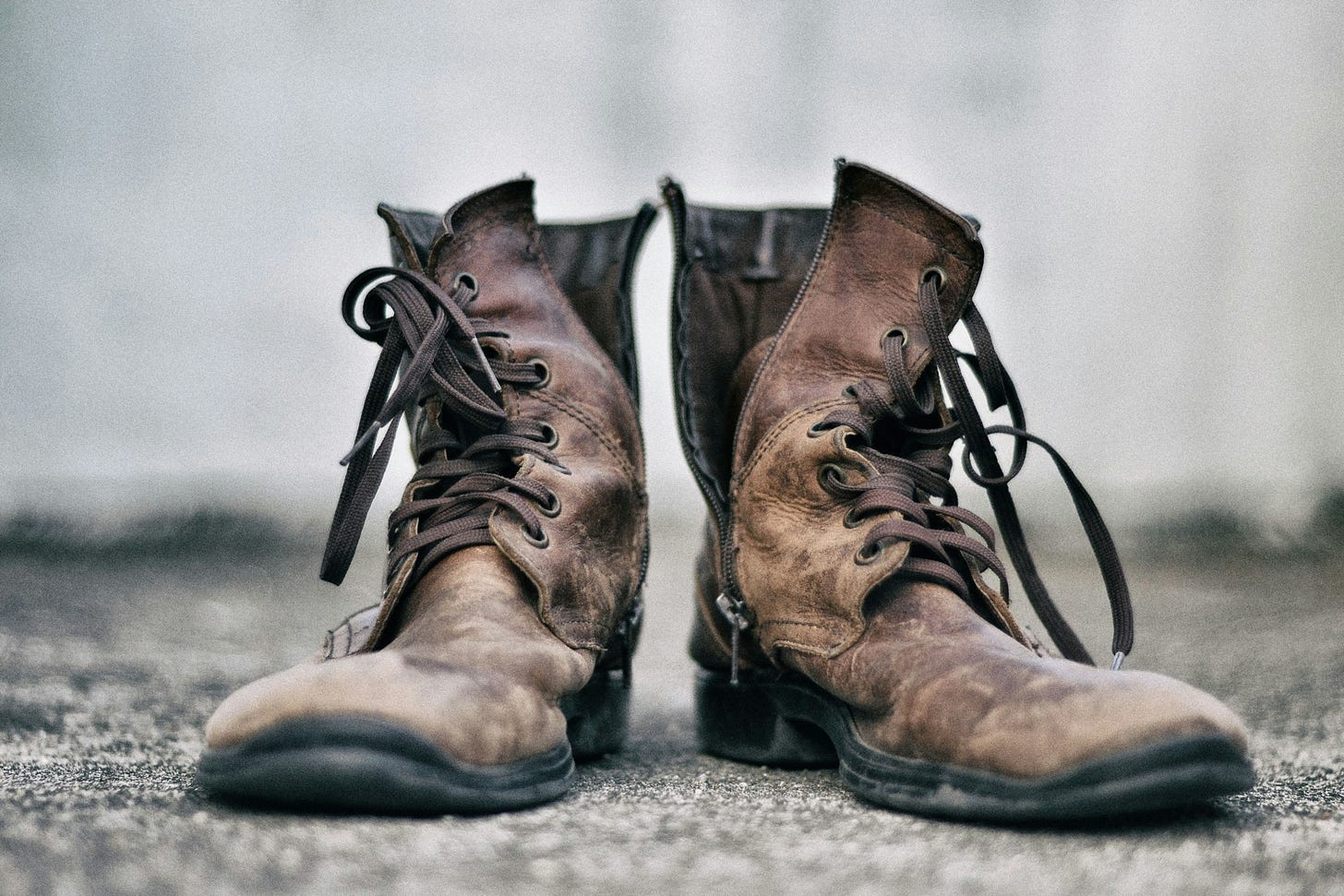Rising from the canvas
Why moving beyond solitude could be your vital 3rd Act
‘One should always have one's boots on and be ready to leave,' Montaigne, the 17th Century French philosopher said as he lay dying. At least that's what we are told. More reliably perhaps, he also wrote: 'A man who fears suffering is already suffering from what he fears.' No one knows what life has in store for us just around the corner and when my wife without warning left me in 2020, my entire world shattered. I had worked for nearly forty years in healthcare, the last twenty years of them at board level. I was exhausted and looking forward to being absorbed in nature, long walks, bird watching and re-wilding a little piece of our own land.
Because of an accident of timing, we had recently moved into a house in a town we didn't know as a stop gap 'home' for our children before I finished my working journey in Qatar. Suddenly alone, I realised this was my first experience of living entirely by myself since I left for university fully forty years previously. I knew no one in the town.
The designed-in loneliness of senior leadership of any large and complex organisation exacerbated my isolation. Over the years I had given to my work, I had once or twice found friendship with people in my organisation, only to be betrayed by them when they attempted to leverage our friendship for their own ends. I had also neglected to build a network of close friends, finding everything I needed with the person I loved. Later, I realised there were other reasons for this failure to find friendship. I will discuss why I think this happened to me in another post.
The first morning was hard. We lived in a noisy house, full of music and conversation, so the silence was devastating. I turned the radio on in every room and for days, I avoided the looming quiet as far as I could. I felt irrevocably lost. Everything I had worked toward, all my dreams, the imagined future, all gone. What remained was just a series of silent and empty rooms. It was hard telling my children what happened. In the conversations with them, I was honest about what I felt, but also reassuring. I didn't want them to worry I might jump off the deep end.
Okay, so why am I writing this stuff down and why am I sharing it here?
I am not looking for sympathy. These days I am happy and life is again full of purpose and meaning. The idea I have is to talk about moving past loneliness. I learnt more about myself in these last years than perhaps I ever have, and I discovered aspects of myself that had lain dormant for far too long. I learned how to heal the wound in my heart, a wound that literally changed the shape of my heart. Takotsubo (or Broken Heart) Syndrome, occurs when grief turns the round heart into a rugby ball, so it pumps less efficiently. Who knew?
There is an important difference between loneliness and solitude. Today, when I'm at home by myself (I spend most of my time this way), I don't feel lonely anymore, and I experience aloneness primarily as solitude. Maybe that's because solitude is voluntary in a way that loneliness isn't. I can choose to step away from solitude any time I want, having built new friendship communities. I will admit this wasn't easy, and I will discuss some lessons I learnt about re-building my world as I struggled to rise from the canvas.
I call this newsletter 'Beyond Solitude' because if there is no path out of solitude, that's just loneliness by another name. I am now in my sixties, which still seems strange to say. I don't feel old, but increasingly I feel there is a benefit in the weight of lived experience I carry. Is this experience a burden? Sometimes, yes, but it also is a source of fuel for the next chapter in my life. And that is the most extraordinary aspect of what I have discovered through all the tears and suffering. Not only does life go on, it can also be better than ever.
In Jim Collins' book 'Good to Great', he discusses the Stockdale Paradox. Admiral James Stockdale was the highest ranking prisoner of war in the 'Hanoi Hilton' in Vietnam. His captors tortured him over twenty times during his eight-year incarceration. The conditions were terrible, with no rights, no release date and no certainty he would ever see his family again. Many of his compatriots died. On his release, he returned to the United States and resumed his life, powerfully and fully. Many were astonished that he could live so fully, apparently without rancour, rage or anguish of any kind.
People asked him two questions. How did you survive and why did others succumb?
To keep himself alive, he said he held onto two contradictory statements with equal conviction the entire time. The first was to accept life currently could not be worse. There was no point wishing it away, it just had to be endured.
The second thought was this: one day his life would be better than ever. The answer to the second question, Stockdale replied, was simple. It was all the optimists who died. “The optimists. Oh, they were the ones who said, ‘We’re going to be out by Christmas.’ And Christmas would come, and Christmas would go. Then they’d say, ‘We’re going to be out by Easter.’ And Easter would come, and Easter would go. And then Thanksgiving, and then it would be Christmas again. And they died of a broken heart.”
Stockdale told Collins this: “You must never confuse faith that you will prevail in the end—which you can never afford to lose—with the discipline to confront the most brutal facts of your current reality, whatever they might be.”
Beyond Solitude is about discovering it is possible to run a life while holding onto to this duality. I also want to write about another truism: it is never too late. And because this is true therefore, life for me continues to expand and open with opportunity, meaning, and purpose.
You might call it a late flowering or even a 3rd Act. What I believe is that living Beyond Solitude must involve writing a new chapter in your life, taking everything you have learnt or experienced and then finding something new to explore. This might be a wholly internal journey, or it could be an outward facing path that explores the boundary, or both.
What matters is putting down the fear, lacing up your boots and beginning again.
Listen to the audio
.



